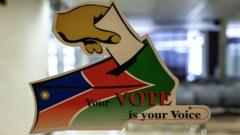This year has seen a dramatic shift in the political landscape across sub-Saharan Africa, with incumbent parties facing major defeats in their electoral battles. Factors such as economic downturns, public intolerance of corruption, and the rise of effective opposition coalitions have contributed to these unexpected results.
Shifting Political Landscape: Governing Parties in Africa Face Electoral Challenges

Shifting Political Landscape: Governing Parties in Africa Face Electoral Challenges
Sub-Saharan Africa's governing parties are experiencing significant electoral setbacks, indicating a growing public desire for change amidst economic hardship and corruption concerns.
As Namibia’s long-standing governing party, Swapo, emerges from the recent elections with a diminished power hold after 33 years, the broader narrative across sub-Saharan Africa reveals a wave of challenges faced by incumbents. Official results show Swapo’s candidate, Netumbo Nandi-Ndaitwah, won the presidential election by securing 57% of the votes, marking a historic milestone as the country’s first female leader. However, opposition parties have rejected the election outcome citing significant logistical issues and irregularities at the polls. Notably puzzling is how Swapo managed to increase its presidential vote share while simultaneously enduring its worst parliamentary performance, losing 12 out of 63 seats.
The discontent shared by voters is not unique to Namibia; a series of elections throughout sub-Saharan Africa in 2024 could signal a shift in the governance landscape. In numerous countries, ruling parties faced significant losses or outright defeat, leading experts to label the past year an "annus horribilis." The Botswana Democratic Party (BDP), which had been in power since independence in 1966, was nearly eliminated in the October elections, collapsing from 38 seats to a mere four. Similarly, in Mauritius, the ruling Alliance Lepep coalition faced a historic defeat, claiming only 27% of the vote and securing just two parliamentary seats against the opposition's 60.
More notable political transformations occurred in Senegal, where political unrest fueled the rise of the opposition after the orchestrated imprisonment of key opposition leaders. Following their release, Bassirou Diomaye Faye won the presidency in a significant reversal of government control. In its neighboring South Africa, the African National Congress (ANC) retained power but found itself compelled to form a coalition government, marking a concerning drop below the 50% vote threshold.
The confluence of societal issues—from rampant corruption and economic mismanagement to increasing public unrest—has resonated deeply with citizens disillusioned by the status quo. The recent voter sentiment aligns with a global trend of dissatisfaction that directly contributed to political upsets, evidenced by the economic anger leading to youth-led protests in Kenya.
As opposition parties adapt and learn from historical shortcomings—including vigilant election monitoring and forming strategic coalitions—the rise of multiparty democracy continues to take shape. With the upcoming general elections in Ghana and Malawi, there exists potential for further shifts in power dynamics, which could culminate in the highest number of opposition victories in the region's history.
Starkly, this pattern unfolds amidst a broader narrative of global democratic retreat, illustrating that Africa's political resilience and civil engagement might actually serve as a beacon of hope for democratic practices worldwide, despite predominant authoritarian regimes. Experts argue that investing attention and resources in sub-Saharan Africa's evolving political landscape could yield valuable insights for international efforts to safeguard democracy.






















